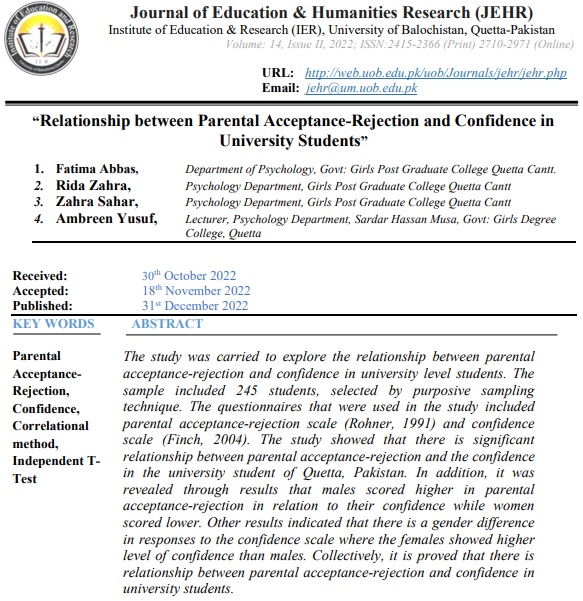Relationship between Parental Acceptance-Rejection and Confidence in University Students
Keywords:
Parental Acceptance-Rejection, Confidence, Correlational method, Independent T-TestAbstract
The study was conducted to explore the relationship between parental acceptance-rejection and confidence in university level students. The sample included 245 students, selected by purposive sampling technique. The questionnaires used were parental acceptance-rejection scale (Rohner, 1991) and confidence scale (Finch, 2004). The study showed that there is significant relationship between parental acceptance-rejection and the confidence in the university student of Quetta, Pakistan. In addition, it was revealed through results that males scored higher in parental acceptance-rejection in relation to their confidence while women scored lower. Other results indicated that there is a gender difference in responses to the confidence scale where the females showed higher level of confidence than males. Collectively, it is proved that there is relationship between parental acceptance-rejection and confidence in university students.
References
Akbari, O., & Sahibzada, J. (2020). Students’ self-confidence and its impacts on their learning process. American International Journal of Social Science Research, 5(1), 1-15. https://doi.org/10.46281/aijssr.v5i1.462
Aktar, R., Sugiura, Y., & Hiraishi, K. (2021). “They Love Me, They Love Me Not”: An IRT‐Based Investigation of the Child Parental Acceptance‐Rejection Questionnaire with a Japanese Sample. Japanese Psychological Research. https://doi.org/10.1111/jpr.12346
Amsel, B. (2013). The Effect of Parental Involvement on Self-Confidence and Self-esteem. Good Therapy. https://www.goodtherapy.org/blog/effects-of-parental-involvement-on-self-confidence-and-self-esteem-0716134
Ansari, B., & Qureshi, S. S. (2013). Parental acceptance and rejection in relation with self-esteem in adolescents. Interdisciplinary Journal of Contemporary Research in Business, 4(11), 552-557. https://journal-archieves30.webs.com/552-557.pdf
APA dictionary of psychology. (2007). Self confidence. American Psychological Association. https://dictionary.apa.org/self-confidence
Bernet, W., Gregory, N., Reay, K. M., & Rohner, R. P. (2018). An objective measure of splitting in parental alienation: The parental acceptance–rejection questionnaire. Journal of forensic sciences, 63(3), 776-783. https://doi.org/10.1111/1556-4029.13625
Dwairy, M. (2010). Parental acceptance–rejection: a fourth cross-cultural research on parenting and psychological adjustment of children. Journal of Child and Family Studies, 19(1), 30-35. https://doi.org/10.1007/s10826-009-9338-y
Finch, A. (2004). English reflections: An interactive, reflective learner journal. Kyungpook National University Press.
Khaleque, A., & Rohner, R. P. (2002). Perceived parental acceptance‐rejection and psychological adjustment: A meta‐analysis of cross‐cultural and intracultural studies. Journal of Marriage and Family, 64(1), 54-64. | Perceived parental acceptance–rejection in childhood predict psychological adjustment and rejection sensitivity in adulthood. Psychological Studies, 64(4), 447-454. https://doi.org/10.1007/s12646-019-00508-z
Krishnan, L. (1988). Parental acceptance-rejection and attitudes to helping: A study of Indian mothers. Psychological Studies. https://psycnet.apa.org/record/1989-22196-001
Kuterovac-Jagodić, G., & Keresteš, G. (1997). Perception of parental acceptance-rejection and some personality variables in young adults. Društvena istraživanja: časopis za opća društvena pitanja, 6(4-5 (30-31)), 477-491. https://hrcak.srce.hr/file/50179
Legere, C. (2020). What is the Difference Between Self- Esteem and Self- Confidence?. TORONTO PSYCHOLOGISTS. https://www.torontopsychologists.com/whats-the-difference-between-self-esteem-and-self-confidence
Lyons, D. (2017). Building confidence in your child prior to early school. Early childhood Australia’s Blog. http://thespoke.earlychildhoodaustralia.org.au/
Mann, M. M., Hosman, C. M., Schaalma, H. P., & De Vries, N. K. (2004). Self-esteem in a broad-spectrum approach for mental health promotion. Health education research, 19(4), 357-372. https://doi.org/10.1093/her/cyg041
Meisha, D. E., & Al‐dabbagh, R. A. (2021). Self‐confidence as a predictor of senior dental student academic success. Journal of Dental Education, 85(9), 1497-1503. https://doi.org/10.1002/jdd.12617
Mendo-Lázaro, S., León-del-Barco, B., Polo-del-Río, M. I., Yuste-Tosina, R., & López-Ramos, V. M. (2019). The role of parental acceptance–rejection in emotional instability during adolescence. International journal of environmental research and public health, 16(7), 1194. https://doi.org/10.3390/ijerph16071194
Morin, A. (2022). Types of parenting styles and their effects on kids. Gans S reviewed What's Your Parenting Style. https://www.verywellfamily.com/types-of-parenting-styles-1095045
Ramírez-Uclés, I., González-Calderón, M. J., del Barrio-Gándara, V., & Carrasco, M. Á. (2017). Perceived parental acceptancerejection and children’s psychological adjustment: the moderating effects of sex and age. Journal of Child and Family Studies. https://link.springer.com/article/10.1007%2Fs10826-017-0975-2
Rohner, R. P. (1986). New perspectives on family. The warmth dimension: Foundations of parental acceptance-rejection theory. Sage Publications, Inc.
Rohner, R. P. (1991). Parental Acceptance-Rejection Questionnaire. https://effectiveservices.force.com/s/measure/a007R00000yFTZvQAO/parental-acceptancerejection-questionnaire
Rohner, R. P. (2014). PARTheory gets a new name: Interpersonal acceptance–rejection theory (IPARTheory). Interpersonal Acceptance, 8(3), 6. https://isipar.uconn.edu/wpcontent/uploads/sites/1774/2016/06/September2014-newsletter.pdf
Rohner, R. P., & Khaleque, A. (2015). Introduction to interpersonal acceptance-rejection theory, methods, evidence, and implications. The University of Connecticut. https://csiar.uconn.edu/wp-content/uploads/sites/494/2014/02/Draft-Interpersonal-ACCEPTANCE-09-01-15.pdf
Rohner, R. P., & Smith, R. L. (2019). Parental acceptance-rejection. In Handbook of parenting (pp. 401-420). Routledge.
Rohner, R. P., Khaleque, A., & Cournoyer, D. E. (2012). Introduction to parental acceptance-rejection theory, methods, evidence, and implications. Journal of Family Theory & Review, 2(1), 73-87. https://www.craigbarlow.co.uk/_webedit/uploaded-files/All%20Files/Risk/INTRODUCTION-TO-PARENTAL-ACCEPTANCE-3-27-12.pdf
Warrel, M. (2015). Use It Or Lose It: The Science Behind Self-Confidence. https://www.forbes.com/sites/margiewarrell/2015/02/26/build-self-confidence-5strategies/?sh=62dae0026ade
Weisinger, H. (2015). The Essence of Confidence. Psychology today. https://www.psychologytoday.com/us/blog/thicken-your-skin/201509/
Wu, H., Li, S., Zheng, J., & Guo, J. (2020). Medical students’ motivation and academic performance: the mediating roles of self-efficacy and learning engagement. Medical education online, 25(1), 1742964. https://doi.org/10.1080/10872981.2020.1742964
Zenger, J. (2018). The confidence gap in men and women: Why it matters and how to overcome it. Pobrane z: www.Forbes.com/sites/jackzenger/2018/04/08/the-confidence-gap-in-men-and-women-why-it-matters-and-how-to-overcome-it




